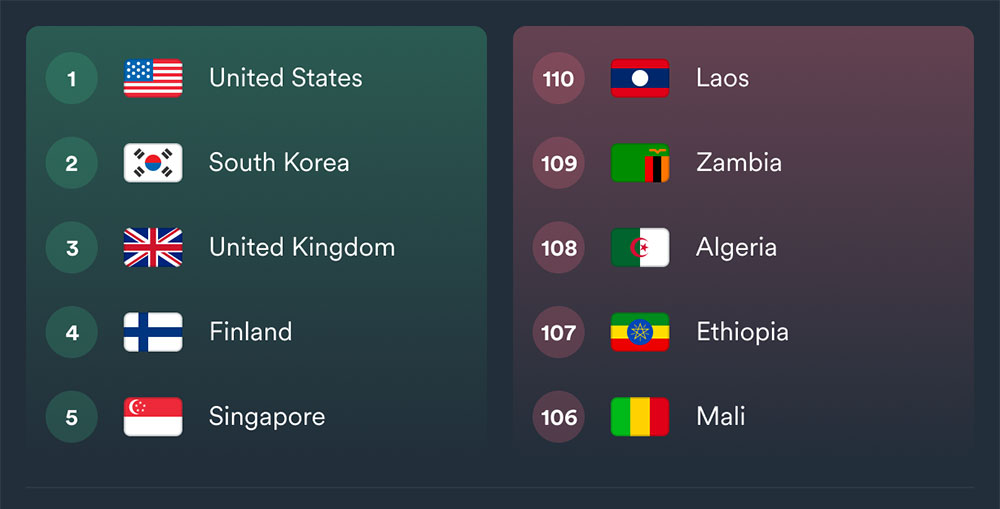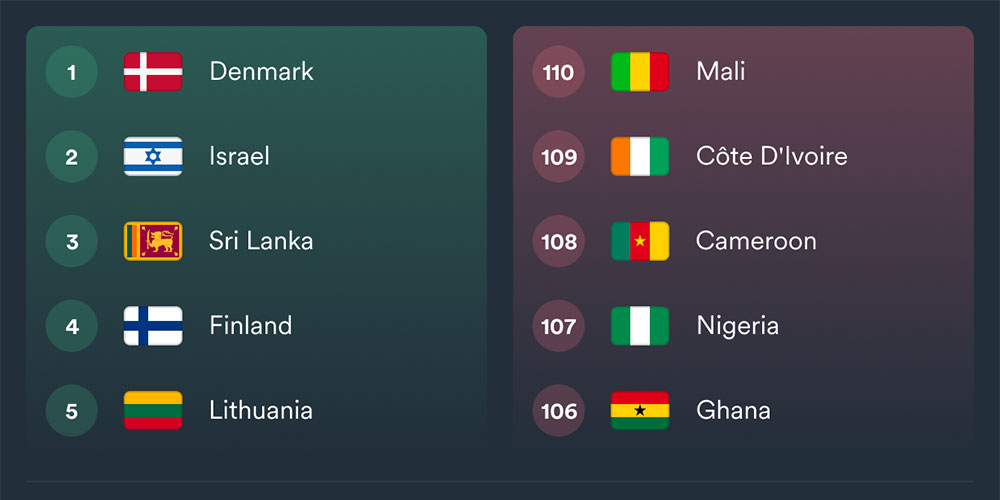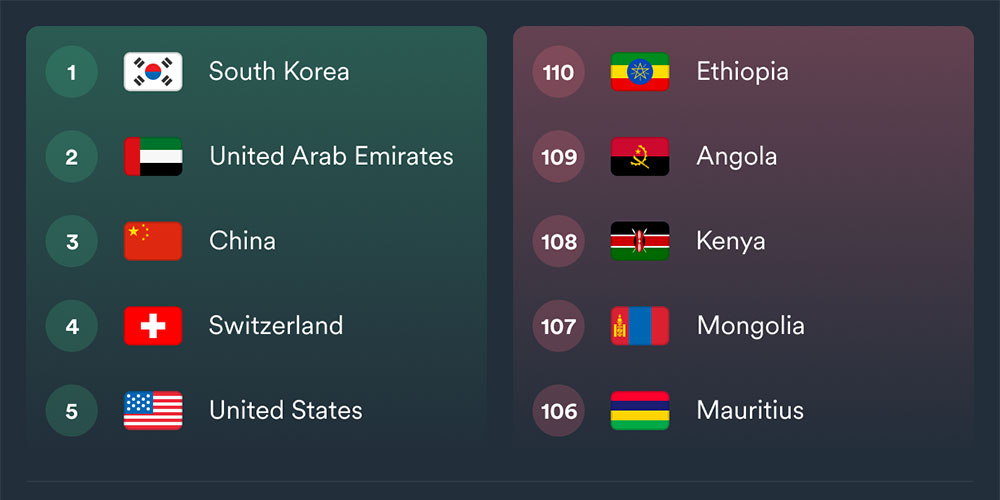If you’re looking for the best digital quality of life in the world, Denmark appears to be the place to go.
According to a study released Monday by VPN provider Surfshark, Hamlet’s homeland finished first among 110 nations based on five “pillars” of measurement: internet affordability, internet quality, infrastructure, security and government.
Within the pillars are 14 “indicators” that further refine the quality of life measurement. For example, within the infrastructure pillar there are two indicators: individuals using the internet and network readiness.
Countries were graded based on index points with the best possible value equal to one. Denmark had the top score with a 0.83, followed by South Korea (0.76), Finland (0.76), Israel (0.74), USA (0.74) and Singapore (0.72).
2021 Digital Quality of Life Index (Source: Surfshark)
“The study’s methodology seems pretty solid,” observed Charles King, the principal analyst at Pund-IT, a technology advisory firm, in Hayward, Calif.
“Surfshark has improved the study since it was launched in 2019, both in terms of the areas investigated and the number of countries and regions covered,” he told TechNewsWorld.
Early Internet Adopter
Roslyn Layton, senior vice president at Strand Consult, a technology consultancy in Copenhagen, Denmark noted that the findings in the Surfshark study are similar to those in reports by the International Telecommunications Union. “Denmark consistently scores at the top,” she told TechNewsWorld.
“Denmark was an early internet adopter, and it quickly put all its government online,” Layton, a naturalized Danish citizen, explained. “It created tools that allowed individuals and businesses to interact with the government.”
“In the United States, there’s a lot of paperwork when dealing with the government,” she continued. “Denmark immediately made that digital. That was a way to stimulate adoption of the internet by everyone.”
“As a result, the government systems are very usable, integrated, seamless and secure,” she said. “That’s been the case for the last 20 years.”
However, in the Surfshark study, the United States finished first in the electronic government category, while Denmark placed sixth.

Most and least developed countries in the e-government category (Image Credit: Surfshark)
“That may be warranted relative to other countries, but our research has found the U.S. still has a lot of room for improvement in providing electronic government services,” observed Joe Kane, director of spectrum and broadband policy at the Information Technology and Innovation Foundation (ITIF), a science and technology think tank in Washington, D.C.
More Competition Needed
Kane asserted that Denmark has some other advantages over the United States when it comes to cultivating digital life there.
“Denmark is a rich, dense country,” he told TechNewsWorld. “This makes it relatively easy to connect the whole county at affordable prices and provide high-quality government services.”

Denmark ranks first in countries with the most affordable internet. At the other end of the spectrum, the five least affordable internet countries all are on the continent of Africa. (Image Credit: SurfShark)
Layton added that Denmark also has a program to keep down the costs of deploying networks. “Permissions to build networks are streamlined,” she explained. “Providers are incentivized to compete and invest.”
That contrasts with the competitive scene in the United States. “In a lot of places in the U.S., there is no competition so there isn’t a lot of incentive for providers to upgrade,” said Jack E. Gold, founder and principal analyst with J.Gold Associates, an IT advisory company in Northborough, Mass.
“That’s changing and changing quickly,” he told TechNewsWorld, “because of 5G and fixed wireless access in a lot of areas.”
He maintained, however, that the United States might be more competitive with other nations if it had a wide-ranging broadband policy. “Many European countries are putting policies in place that say, ‘You will do this, and we’ll fund it.’ That gives some countries an advantage,” he explained. “In the U.S., it’s all about private enterprise.”
Doing Well, Despite Challenges
King noted that while the U.S. is a leading market in both technology development and products, the federal government’s business-friendly approach had resulted in wide disparities in internet quality, availability, and cost. “The ‘digital divide’ continues to be wide, especially in rural and smaller communities,” he said.
“In the United States there are people without digital skills,” Layton added. “They lack education. Many lack an interest to get online at all, although that’s definitely changed with Covid — and because the United States is a much bigger country, you have the costs of bringing networks to rural areas.”
“The U.S. has done well given its challenges,” she continued, “but it still has an issue with people not trusting the government.”
When comparing the United States to other nations in the Surfshark study, it’s important to note how much larger the U.S. is to the countries above it in the rankings, maintained Bruce Leichtman, president, principal and analyst with the Leichtman Research Group in Durham, N.H.
The U.S. has some 125 million households, compared to 2.7 million in Denmark, 21.5 million in South Korea, 1.5 million in Finland, and 2.1 million in Israel. “So, one could say that given the size of the U.S., it is performing particularly well,” he told TechNewsWorld.
Subjective Subject
Although South Korea finished second in the overall rankings, it captured the top spot in internet quality and both broadband and mobile speed growth.
“One of the reasons South Korea has a lot of bandwidth is that gaming is very popular there,” Gold explained. He added that the government has made it a policy to get everyone high-speed broadband in the next couple of years.

Best and worst countries for internet quality (Image Credit: Surfshark)
“South Korea has long been proactive in supporting the development and deployment of leading-edge internet-based services and solutions,” observed King. “Add in leading tech companies, including Samsung, SK and LG, and South Korea’s ranking is no surprise.”
A lot of South Korea’s digital infrastructure is relatively new, which contrasts with the United States. “A lot of the infrastructure we have in place in the U.S. is 30, 40 years old and hasn’t been upgraded,” Gold said. “A lot of the newer, high-growth countries have been putting new stuff in place or upgrading over the last few years. That makes a big difference.”
While Surfshark’s study may intrigue some, Gold warned that the digital quality of life can be a very subjective thing. “What you need and what I need may be very different from what our kids need,” he said.
Moreover, the Surfshark findings may be more interesting to people outside the countries in the study than those in it. “Users in every country are typically happy with what they have, even if what they have is better or worse than other countries,” observed technology analyst Jeff Kagan.
“While some countries are faster than others, users don’t know or care,” he told TechNewsWorld. “So, while these studies are always fun to think about and talk about, I don’t think they make any difference on the satisfaction of users.”















































Social Media
See all Social Media